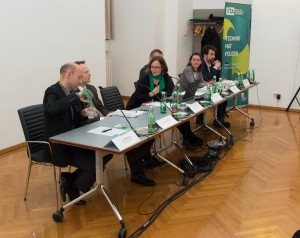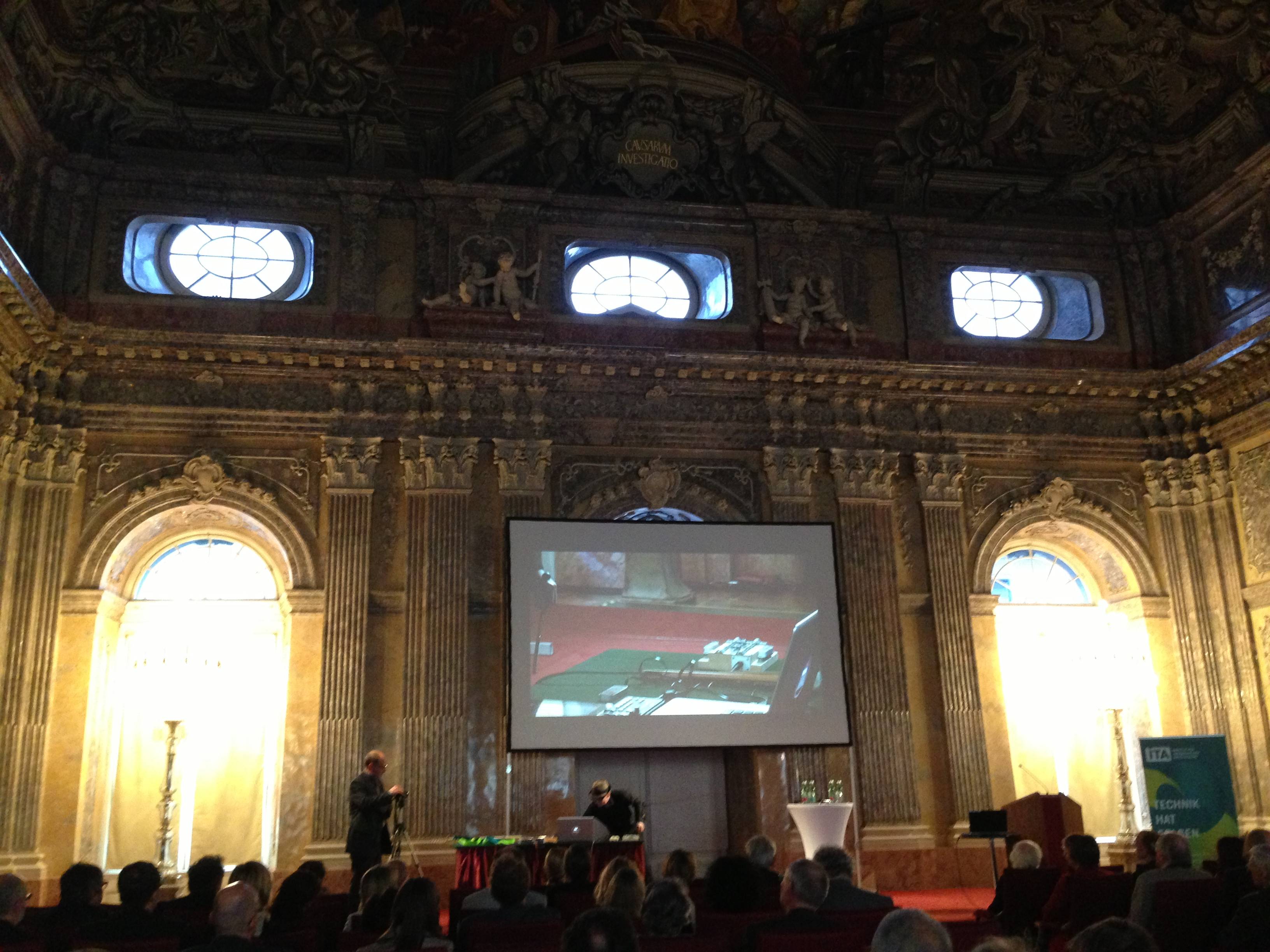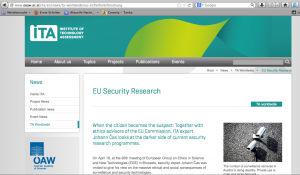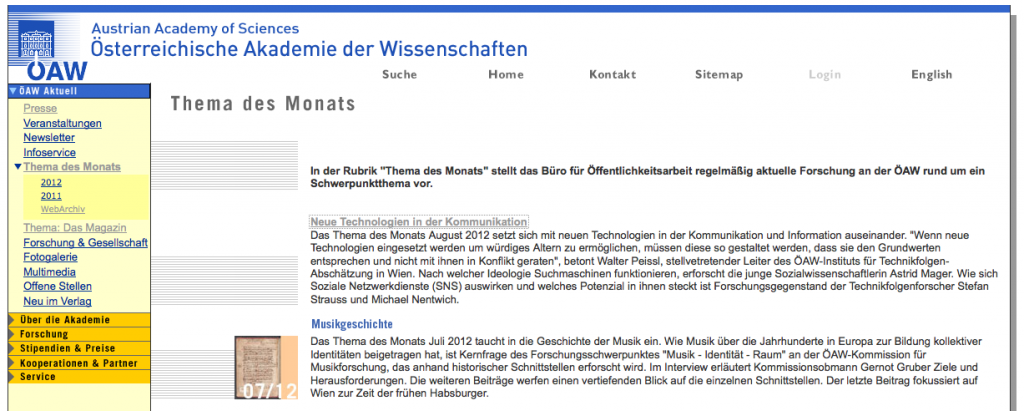 We’re happy that we got almost 20 papers for our panel “ICTs and power relations. Present dilemmas and future perspectives” (a panel I co-organize with my ITA colleagues Doris Allhutter & Stefan Strauss). Thanks to the conference organizers we’ll be able to put together two (maybe even three) sessions! YAY. We’ll go through all the abstracts in the next couple of weeks.. I’m already looking forward to that!
We’re happy that we got almost 20 papers for our panel “ICTs and power relations. Present dilemmas and future perspectives” (a panel I co-organize with my ITA colleagues Doris Allhutter & Stefan Strauss). Thanks to the conference organizers we’ll be able to put together two (maybe even three) sessions! YAY. We’ll go through all the abstracts in the next couple of weeks.. I’m already looking forward to that!
That’s the abstract I submitted. I hope it will make it through our tough review process! 😉 Comments & thoughts are highly welcome!!
Algorithmic Imaginaries. Visions and values in the co-production of search engine politics and Europe
Information and communication technologies (ICTs) have been described as transcending and transforming national borders, political regimes, and power relations. They have been envisioned as creating a global network society with hubs and links rather than cities and peripheries; “technological zones” (Barry 2006) rather than political territories. This reordering of distance and space was described as going hand in hand with processes of reordering social life. Such deep entanglements of technological and social arrangements have been coined as processes of co-production (Jasanoff 2005). While this “sociotechnical imaginary of the internet” (Felt 2014) was framed as all-encompassing and world-spanning at first, it is now increasingly seen as conflicting with the diversity of cultural, political, and social values on the ground. Accordingly, alternative interpretations of ICTs and their multiple socio-political implications have emerged over the past years.
Especially in the European context, tensions between US-American internet services, Google and its “algorithmic ideology” (Mager 2012, 2014) most importantly, and European visions and values may be observed. After the NSA scandal critical voices have become louder and louder; both in the policy and the public arena. Out of a sudden, issues like privacy, data protection, informational self-determination, and the right to be forgotten have been conceptualized as core European values (even though European secret services heavily surveilled its citizens too – arguable more intensely than the NSA in the British case). This shows that there is a European voice forming that aims at distancing and emancipating Europe from US-American tech companies and their business models based on user-targeted advertising and large-scale citizen surveillance. However, it further shows that there are tensions running through European countries and their national interests, identities and ideologies too. One reason is that Europe is neither a clear-cut, homogeneous entity, nor fixed and stable. In the context of biotechnology policy Jasanoff (2005: 10) argues: “Europe in particular is a multiply imagined community in the minds of the many actors who are struggling to institutionalize their particular versions of Europe, and how far national specificities should become submerged in a single European nationhood – economically, politically, ethically – remains far from settled.”
So how is Europe imagined in the context of search engine politics and how are search engines imagined in Europe? And how does the European imaginary relate to national visions and values of search engines? These are the main questions to be answered in the presented analysis by taking Austria as a case study. Analyzing European policy discourses the study examines how search engines – Google in particular – are imagined in the European policy context, what visions and values guide search engine politics, and how Europe is constructed in these narratives. Analyzing Austrian media debates the project investigates how the European imaginary is translated into and transformed in the Austrian context, how Google is portrayed in these debates, and what national specificities shape the narratives. A particular focus is put on the ongoing negotiation of the European data protection reform since this is a central arena where search engines (and other data processing technologies like social media etc) and the European identity are co-constructed these days, but also a site where European disparities, national interests, and local value-systems are at stake. Using a discourse analytical approach and the concept of “sociotechnical imaginaries” (Jasanoff and Kim 2009) this study will give insights in the way ICTs and Europe are co-produced, but also what tensions and contradictions appear between the European imaginary and national interests. While European policy documents try to speak with one voice, the Austrian media shows more nuanced stories of power relations, struggles, and friction that open up the view on the fragility of the European identity when it comes to sensitive, value-laden areas like search engine politics.
Google is a particularly interesting technology in this respect since Google was one of the first US-American tech companies that came under scrutiny in the European context. In 2010 Google tried to launch its street view service on the European market. Rather than euphorically embracing the service, however, European citizens, NGOs, and policy makers went on the barricades and started protesting against Google cars in various cities and regions. An Austrian farmer, for example, sparked media publicity by attacking a Google car with a pickaxe. After Google’s illegal scraping of open WiFi data Google cars were banned from Austrian streets for some time (not surprisingly the service was continued later on after Google accepted some restrictions). While the street view debate was the first one that had values like privacy and data protection at its core, the issue was handled nationally back then. Every European country took different actions according to their stance towards the service (varying from unrestricted acceptance in some countries to (initial) blockage in others).
Despite these differences among European countries (or also because of them), a European vision – a European “algorithmic imaginary” – started to form in the aftermath of the street view debate. While it was only a silent voice at first, it grew into a stronger message that took its written form in the first draft of the European data protection reform that was launched in early 2012. Since then various actors tried to force their interests into the legislative text – most prominently the US-American IT industry, but also European NGOs and national stakeholders; some of them started lobbying even before the European Commission presented its very first draft. These heavy negotiations show how important this piece of text is for multinational actors doing business on the European market. Even though the reform is far from being finished, the judgment of the “right to be forgotten” that forced Google to obey European law may be seen as a first step towards putting the European imaginary into practice. The Austrian media frames this case as a success in showing US-American IT companies like Google that making business on the European market requires obeying European law. Looking more closely and integrating national visions and values into the analysis, however, indicates how fragile the European imaginary still is, and what tensions and contradictions it faces when being translated into national and local contexts. It shows that Europe tries to speak with a strong voice when addressing other countries and continents, the US most importantly, but how weak its voice becomes when it is confronted with itself. The ongoing reform of the data protection reform offers particularly rich materials to trace this dynamic. It is an arena where search engines, business models, and algorithmic logics are negotiated, but also an arena where Europe is forming and falling apart – both at the same time.
So if our information society is at the crossroads, as stated in the conference abstract, we need to understand tight entanglements between technological and social arrangements before taking the next junction. Only when (re)grounding global ICTs in specific socio-political contexts alternative routes may be taken towards more democratic, more sustainable, and more culturally sensitive network technologies (whether this requires stricter regulations of US-American technologies or developing alternative “European” services, or both, remains to be seen). What we may learn from the geopolitics of search engines in terms of global power relations, European identity construction, and concepts of nationhood will be finally discussed.
Acknowledgment
The research presented in this paper is supported by the Jubilee Fund of the Austrian National Bank (OeNB), project number 14702.
References
Barry, A. (2006) Technological Zones. European Journal of Social Theory 9(2): 239-253.
Felt, U. (forthcoming) Sociotechnical imaginaries of “the internet”, digital health information and the making of citizen patients, to appear in Hilgartner S., Miller, C., and Hagendijk, R.: Science and Democracy: Making Knowledge and Making Power in the Biosciences and Beyond, London/ New York: Routledge.
Jasanoff, S. (2005) Designs on Nature. Science and Democracy in Europe and the United States, Oxfordshire: Princeton University Press.
Jasanoff, S. and S. Kim (2009) Containing the Atom: Sociotechnical imaginaries and Nuclear Power in the United States and South Korea, Minerva 47(2): 119-146.
Mager, A. (2012) Algorithmic Ideology. How capitalist society shapes search engines, Information, Communication & Society 15(5): 769-787.
Mager, A. (2014) Defining Algorithmic Ideology: Using Ideology Critique to Scrutinize Corporate Search Engines, Triple C. Cognition, Communication and Co-Operation 12(1).
 The report triggered lots of media coverage, e.g. in APA Science or at orf.at. We also did some interviews, e.g. for the Austrian Academy of Sciences, Futurezone or the radio broadcast Ö1 (all in German). The final report is in German, but english publications will (hopefully) follow SOON! For now I’d like to point you to the english publications in New Frontiers in Big Data that we published a year ago (only based on publicly available materials back then, but still relevant in its argumentation):
The report triggered lots of media coverage, e.g. in APA Science or at orf.at. We also did some interviews, e.g. for the Austrian Academy of Sciences, Futurezone or the radio broadcast Ö1 (all in German). The final report is in German, but english publications will (hopefully) follow SOON! For now I’d like to point you to the english publications in New Frontiers in Big Data that we published a year ago (only based on publicly available materials back then, but still relevant in its argumentation):

 Thanks to Thomas Bayer for his help!
Thanks to Thomas Bayer for his help!






